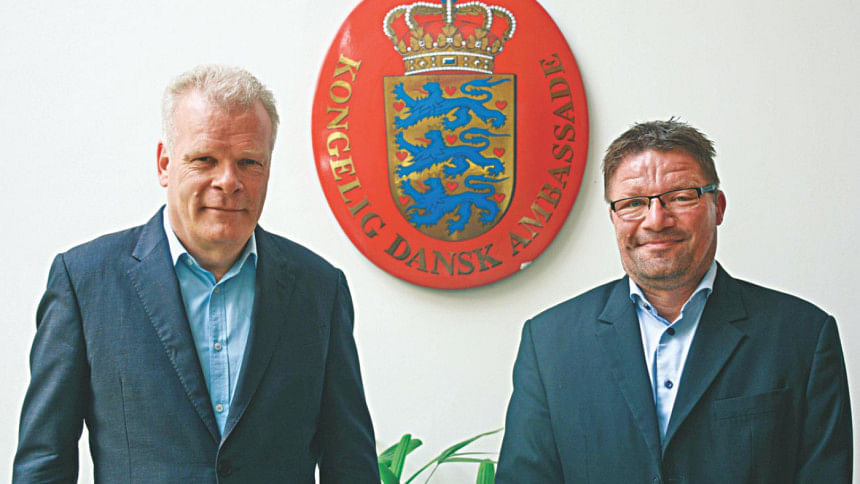Policy consistency crucial for FDI

Consistent and clear policies, especially in areas of tariff, are central in attracting investments from abroad, said Mikael Hemniti Winther, the Danish ambassador to Bangladesh.
Danish companies operating in Bangladesh want to invest more for setting up new units and expanding the existing ones, he told The Daily Star in an interview recently.
“But the companies are often disappointed to see the policy inconsistency. In Bangladesh, rules change frequently, without considering the risks of businesses,” Winther said, while referring to the tax on filled milk powder.
The government in its budget in June proposed lowering the import tax to 10 percent, but after some days the previous tariff rate of 25 percent was reinstated.
“It was very disappointing,” said the envoy, who was accompanied by Peter Hallberg, managing director of Arla Foods Bangladesh that sells the Dano brand of powdered milk.
Milk is not a luxury product that it needs to be taxed so highly, Winther said, adding that the high tax on filled milk powder has become a barrier to reducing the price and making the item available to the lowest income group.
Dano, which is imported but packaged locally, is a source of nutrition for lower and poor income people, he said, adding that a small pack of Dano filled milk costs only Tk 5.
“We had a good dialogue with the government and the tariff rate was supposed to be reduced,” Winther said as a reference of the policy inconsistency in Bangladesh.
In other countries, the tax rate hovers between 0 and 5 percent, he said, citing countries like Malaysia, Thailand, Indonesia and Singapore as cases in point.
Milk is a concentrated source of macro and micro nutrients, meaning it can play a vital role in improving nutrition in developing countries like Bangladesh, Hallberg said.
“Yet, milk consumption in Bangladesh is far lower than the requirement.”
Bangladesh's per capita milk consumption is almost half of the World Health Organisations' recommendation of daily intake of 250ml per day, he said.
Data showed despite having around five million cows and buffalos in Bangladesh, the total production of milk is limited as yields remain low at 1 to 3 litres a day per cow.
Hallberg attributed the low yield on poor genetics, insufficient feeding practices, disorganised breeding procedures, poor management practices, neglect of animal health care and a lack of an efficient animal value chain.
“Food and water are also very important for higher yield. Stressed cows cannot give a lot of milk,” said the chief of Arla Foods Bangladesh.
A cow in Denmark gives 25 to 35 kg milk per day; in Bangladesh the yield is between 2.5kg to 5kg, he said, while emphasising on the need for education and training for dairy farmers.
Another problem in Bangladesh's dairy sector is its informal nature: 90 percent of the farms have an average size of 1 to 3 cows.
“We want to help Bangladesh in improving its dairy sector,” Hallberg added.
But, Danish technology and products are not cheap, said its ambassador to Bangladesh for the last two year.
More than 70 Danish companies such as Novo Nordisk and Dan Cake have so far established their business in Bangladesh in the form of either foreign direct investment or joint venture or liaison office.
To ensure food quality Bangladesh needs help -- technology and know-how -- from foreign companies, Winther said.
Bangladesh also needs to change its mindset and local companies should not see foreign companies as their enemies, Hallberg said.
“We can help Milk Vita based on our experience in Arla Foods, which is a cooperative farm of 12,000 farmers in Denmark.”
The cooperative has helped Denmark address the inequality and influence of middlemen in the system -- from grass to the glass.
Arla wants to market liquid milk in addition to the powdered milk. “But that needs policy stability and support from the government,” Hallberg said.
“Businesses want some kind of assurance. We don't mind giving protection to local companies considering consumers' point of view, but the government needs to be a little bit more liberal to foreign companies,” Winther said.
Yet, Bangladesh remains an attractive place for investment of Nordic companies, according to a recent Business Confidence Survey conducted by the Nordic Chamber of Commerce.
Some 94 percent of the respondents said they are looking to expand their operations in Bangladesh and they expect investments to go up to Tk 2,000 crore over the next three years.
But, according to the Danish envoy, Bangladesh is a complicated country with a number of barriers, such as bureaucracy, corruption, infrastructure and port constraints, political stability and policy inconsistency.
“All of it needs to be addressed if the country wants more foreign investments.”
Arla Foods Bangladesh's revenue was around 43 million euro in 2017 and its global figure was 10 billion euro.
Bangladesh's exports to Denmark were nearly $700 million in fiscal 2017-18 and imports about $100 million, according to government data.
Danish companies are investing in different industrial sectors in Bangladesh such as shipping, textile, light engineering and also in ICT sectors under DANIDA's business-to-business promotion programme and through joint-ventures.
The ambassador said Bangladesh's economic growth for a decade was very impressive.
Yet, the potential is much higher than what the country is performing now.
But to materialise that potential into reality Bangladesh needs a lot, such as foreign investments, new and green technology and knowledge transfer where Denmark stands tall.

 For all latest news, follow The Daily Star's Google News channel.
For all latest news, follow The Daily Star's Google News channel. 



Comments